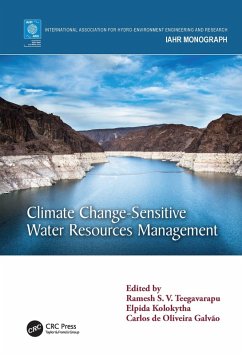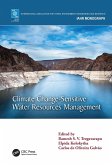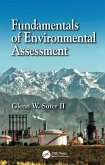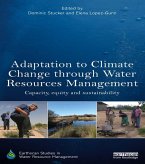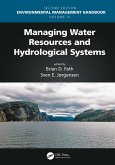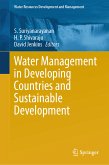Climate Change-Sensitive Water Resources Management (eBook, PDF)
Redaktion: Teegavarapu, Ramesh S. V.; Galvão, Carlos de Oliveira; Kolokytha, Elpida
57,95 €
57,95 €
inkl. MwSt.
Sofort per Download lieferbar

29 °P sammeln
57,95 €
Als Download kaufen

57,95 €
inkl. MwSt.
Sofort per Download lieferbar

29 °P sammeln
Jetzt verschenken
Alle Infos zum eBook verschenken
57,95 €
inkl. MwSt.
Sofort per Download lieferbar
Alle Infos zum eBook verschenken

29 °P sammeln
Climate Change-Sensitive Water Resources Management (eBook, PDF)
Redaktion: Teegavarapu, Ramesh S. V.; Galvão, Carlos de Oliveira; Kolokytha, Elpida
- Format: PDF
- Merkliste
- Auf die Merkliste
- Bewerten Bewerten
- Teilen
- Produkt teilen
- Produkterinnerung
- Produkterinnerung

Bitte loggen Sie sich zunächst in Ihr Kundenkonto ein oder registrieren Sie sich bei
bücher.de, um das eBook-Abo tolino select nutzen zu können.
Hier können Sie sich einloggen
Hier können Sie sich einloggen
Sie sind bereits eingeloggt. Klicken Sie auf 2. tolino select Abo, um fortzufahren.

Bitte loggen Sie sich zunächst in Ihr Kundenkonto ein oder registrieren Sie sich bei bücher.de, um das eBook-Abo tolino select nutzen zu können.
Discusses topics ranging from hydrologic design to management and policy responses to climate change, bringing updated theories that highlight methods, tools, and experiences on the topic of water resources under climate change. For water resources managers, scientists, and professionals from water management agencies.
- Geräte: PC
- ohne Kopierschutz
- eBook Hilfe
- Größe: 24.29MB
Andere Kunden interessierten sich auch für
![Climate Change-Sensitive Water Resources Management (eBook, ePUB) Climate Change-Sensitive Water Resources Management (eBook, ePUB)]() Climate Change-Sensitive Water Resources Management (eBook, ePUB)57,95 €
Climate Change-Sensitive Water Resources Management (eBook, ePUB)57,95 €![Microalgae in Waste Water Remediation (eBook, PDF) Microalgae in Waste Water Remediation (eBook, PDF)]() Arun KumarMicroalgae in Waste Water Remediation (eBook, PDF)66,95 €
Arun KumarMicroalgae in Waste Water Remediation (eBook, PDF)66,95 €![Control of Heavy Metals in the Environment (eBook, PDF) Control of Heavy Metals in the Environment (eBook, PDF)]() Control of Heavy Metals in the Environment (eBook, PDF)51,95 €
Control of Heavy Metals in the Environment (eBook, PDF)51,95 €![Fundamentals of Environmental Assessment (eBook, PDF) Fundamentals of Environmental Assessment (eBook, PDF)]() Glenn W. Suter IIFundamentals of Environmental Assessment (eBook, PDF)0,00 €
Glenn W. Suter IIFundamentals of Environmental Assessment (eBook, PDF)0,00 €![Adaptation to Climate Change through Water Resources Management (eBook, PDF) Adaptation to Climate Change through Water Resources Management (eBook, PDF)]() Adaptation to Climate Change through Water Resources Management (eBook, PDF)51,95 €
Adaptation to Climate Change through Water Resources Management (eBook, PDF)51,95 €![Managing Water Resources and Hydrological Systems (eBook, PDF) Managing Water Resources and Hydrological Systems (eBook, PDF)]() Managing Water Resources and Hydrological Systems (eBook, PDF)54,95 €
Managing Water Resources and Hydrological Systems (eBook, PDF)54,95 €![Water Management in Developing Countries and Sustainable Development (eBook, PDF) Water Management in Developing Countries and Sustainable Development (eBook, PDF)]() Water Management in Developing Countries and Sustainable Development (eBook, PDF)113,95 €
Water Management in Developing Countries and Sustainable Development (eBook, PDF)113,95 €-
-
-
Discusses topics ranging from hydrologic design to management and policy responses to climate change, bringing updated theories that highlight methods, tools, and experiences on the topic of water resources under climate change. For water resources managers, scientists, and professionals from water management agencies.
Dieser Download kann aus rechtlichen Gründen nur mit Rechnungsadresse in A, B, BG, CY, CZ, D, DK, EW, E, FIN, F, GR, HR, H, IRL, I, LT, L, LR, M, NL, PL, P, R, S, SLO, SK ausgeliefert werden.
Produktdetails
- Produktdetails
- Verlag: Taylor & Francis eBooks
- Seitenzahl: 190
- Erscheinungstermin: 17. Dezember 2020
- Englisch
- ISBN-13: 9781000293937
- Artikelnr.: 60544932
- Verlag: Taylor & Francis eBooks
- Seitenzahl: 190
- Erscheinungstermin: 17. Dezember 2020
- Englisch
- ISBN-13: 9781000293937
- Artikelnr.: 60544932
- Herstellerkennzeichnung Die Herstellerinformationen sind derzeit nicht verfügbar.
Ramesh S. V. Teegavarapu (Dr. T.) is a professor and graduate program director in the Department of CEGE and founder and leader of the Hydro systems Research Laboratory (HRL) at FAU. His main research interests are in the areas of climate change and variability, hydro climatic extremes, water, and environmental systems management, spatial hydrology and hydrometeorology. He is a recipient of several national and international awards including Fulbright Scholar, Fulbright Specialist and awards from the American Society of Civil Engineers (ASCE), British Hydrologic Society (BHS), NSERC Canada. Dr. T. has worked as international visiting professors at Kobe University, Japan, University of Brescia and Politecnico Di Torino, Italy; and lectured in workshops/conferences, gave invited talks and keynote lectures in 18 countries. Dr. T. has published over 120 technical articles in high impact journals and conference proceedings and authored 25 book chapters, five mini-chapters and is an author, co-editor, and sole-editor of several books from multiple reputed international publishers. He is a contributing member and lead member of several international technical committees and served as a thesis committee member for over a dozen international doctoral dissertations. Personal website: http://faculty.eng.fau.edu/ramesh; Lab website: http://hrl.fau.edu. Elpida Kolokytha is currently a professor in the Department of Civil Engineering, Aristotle University of Thessaloniki, Greece. She has more than 25 years of research experience, together with coordination skills, in the field of environmental policy, integrated water resources management, sustainable development, social and economic aspects of water resources, national, European and International legislation of water resources as well as transboundary river basin management and climate change assessment and adaptation. She has published more than 100 papers in scientific journals and conference proceedings and she is a member of several scientific associations related to water resources management and engineering worldwide. She is also the Director of AUTh UNESCO Center for Integrated and Interdisciplinary Water Resources Management. Carlos de Oliveira Galvão is a Professor at the Department of Civil Engineering at the Federal University of Campina Grande (UFCG), Brazil. He has over 35 years of research experience in the fields of experimental-basin hydrology, climate change and water resources, rainwater harvesting, and water resources management. He is currently a member of the Leadership Teams of the IAHR's Technical Committee on Water Resources Management and of the Sustainable Development Goals Working Group. Prior to his tenure at UFCG he was a researcher at the Brazilian Corporation for Agricultural Research (EMBRAPA).
1. Water resources management under changing climate: major issues 2. WRM
and EU policies to adapt to climate change: experience from Greece 3.
Responding to climate change impacts on water resources and management:
insights from Australia 4. Optimization of the operation of multi-purpose
dams using ensemble prediction: case study from Japan 5. Hydroclimatic
variability across Tapi basin, India: issues and implications 6.
Effectiveness of adaptation options for multi-purpose reservoir operation
to climate change: a case study in Japanese river basins 7. Nature-based
solutions as climate change adaptation and mitigation measures in Italy 8.
Spatial modelling of knowledge: water resources management in a Brazilian
coastal area 9. Evolving adaptive hydrologic design and water resources
management in a changing climate: experiences from the U.S. 10.
Incorporation of robustness and adaptiveness into reservoir operations
under climate change 11. The way ahead: adaptive water management and
climate effects
and EU policies to adapt to climate change: experience from Greece 3.
Responding to climate change impacts on water resources and management:
insights from Australia 4. Optimization of the operation of multi-purpose
dams using ensemble prediction: case study from Japan 5. Hydroclimatic
variability across Tapi basin, India: issues and implications 6.
Effectiveness of adaptation options for multi-purpose reservoir operation
to climate change: a case study in Japanese river basins 7. Nature-based
solutions as climate change adaptation and mitigation measures in Italy 8.
Spatial modelling of knowledge: water resources management in a Brazilian
coastal area 9. Evolving adaptive hydrologic design and water resources
management in a changing climate: experiences from the U.S. 10.
Incorporation of robustness and adaptiveness into reservoir operations
under climate change 11. The way ahead: adaptive water management and
climate effects
1. Water resources management under changing climate: major issues 2. WRM
and EU policies to adapt to climate change: experience from Greece 3.
Responding to climate change impacts on water resources and management:
insights from Australia 4. Optimization of the operation of multi-purpose
dams using ensemble prediction: case study from Japan 5. Hydroclimatic
variability across Tapi basin, India: issues and implications 6.
Effectiveness of adaptation options for multi-purpose reservoir operation
to climate change: a case study in Japanese river basins 7. Nature-based
solutions as climate change adaptation and mitigation measures in Italy 8.
Spatial modelling of knowledge: water resources management in a Brazilian
coastal area 9. Evolving adaptive hydrologic design and water resources
management in a changing climate: experiences from the U.S. 10.
Incorporation of robustness and adaptiveness into reservoir operations
under climate change 11. The way ahead: adaptive water management and
climate effects
and EU policies to adapt to climate change: experience from Greece 3.
Responding to climate change impacts on water resources and management:
insights from Australia 4. Optimization of the operation of multi-purpose
dams using ensemble prediction: case study from Japan 5. Hydroclimatic
variability across Tapi basin, India: issues and implications 6.
Effectiveness of adaptation options for multi-purpose reservoir operation
to climate change: a case study in Japanese river basins 7. Nature-based
solutions as climate change adaptation and mitigation measures in Italy 8.
Spatial modelling of knowledge: water resources management in a Brazilian
coastal area 9. Evolving adaptive hydrologic design and water resources
management in a changing climate: experiences from the U.S. 10.
Incorporation of robustness and adaptiveness into reservoir operations
under climate change 11. The way ahead: adaptive water management and
climate effects
